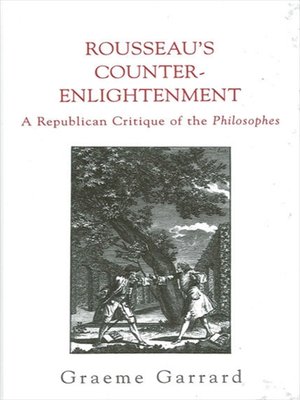Rousseau's Counter-Enlightenment
ebook ∣ A Republican Critique of the Philosophes · SUNY series in Social and Political Thought
By Graeme Garrard

Sign up to save your library
With an OverDrive account, you can save your favorite libraries for at-a-glance information about availability. Find out more about OverDrive accounts.
Find this title in Libby, the library reading app by OverDrive.



Search for a digital library with this title
Title found at these libraries:
| Library Name | Distance |
|---|---|
| Loading... |
Sees Rousseau as the father of Counter-Enlightenment thought.
Arguing that the question of Jean-Jacques Rousseau's relationship to the Enlightenment has been eclipsed and seriously distorted by his association with the French Revolution, Graeme Garrard presents the first book-length case that shows Rousseau as the pivotal figure in the emergence of Counter-Enlightenment thought. Viewed in the context in which he actually lived and wrote-from the middle of the eighteenth century to his death in 1778-it is apparent that Rousseau categorically rejected the Enlightenment "republic of letters" in favor of his own "republic of virtue." The philosophes, placing faith in reason and natural human sociability and subjecting religion to systematic criticism and doubt, naively minimized the deep tensions and complexities of collective life and the power disintegrative forces posed to social order. Rousseau believed that the ever precarious social order could only be achieved artificially, by manufacturing "sentiments of sociability," reshaping individuals to identify with common interests instead of their own selfish interests.







